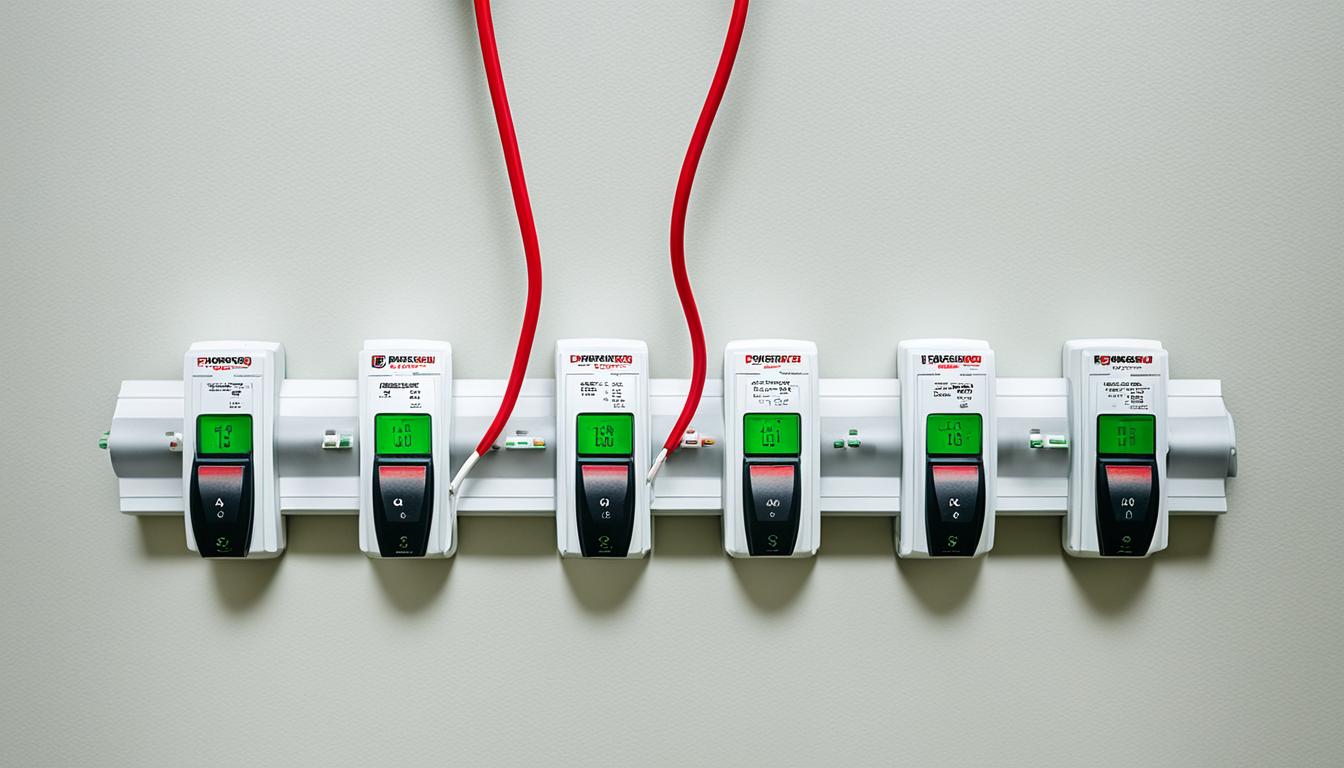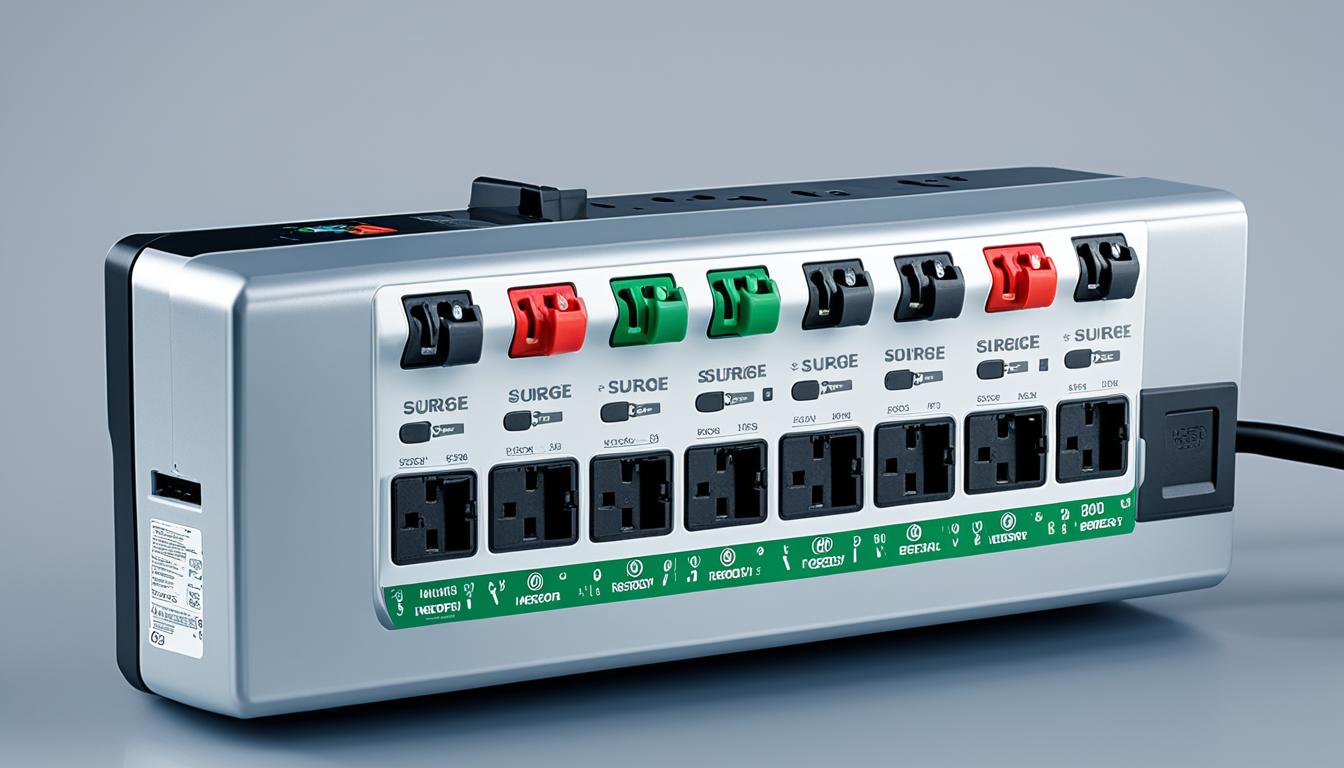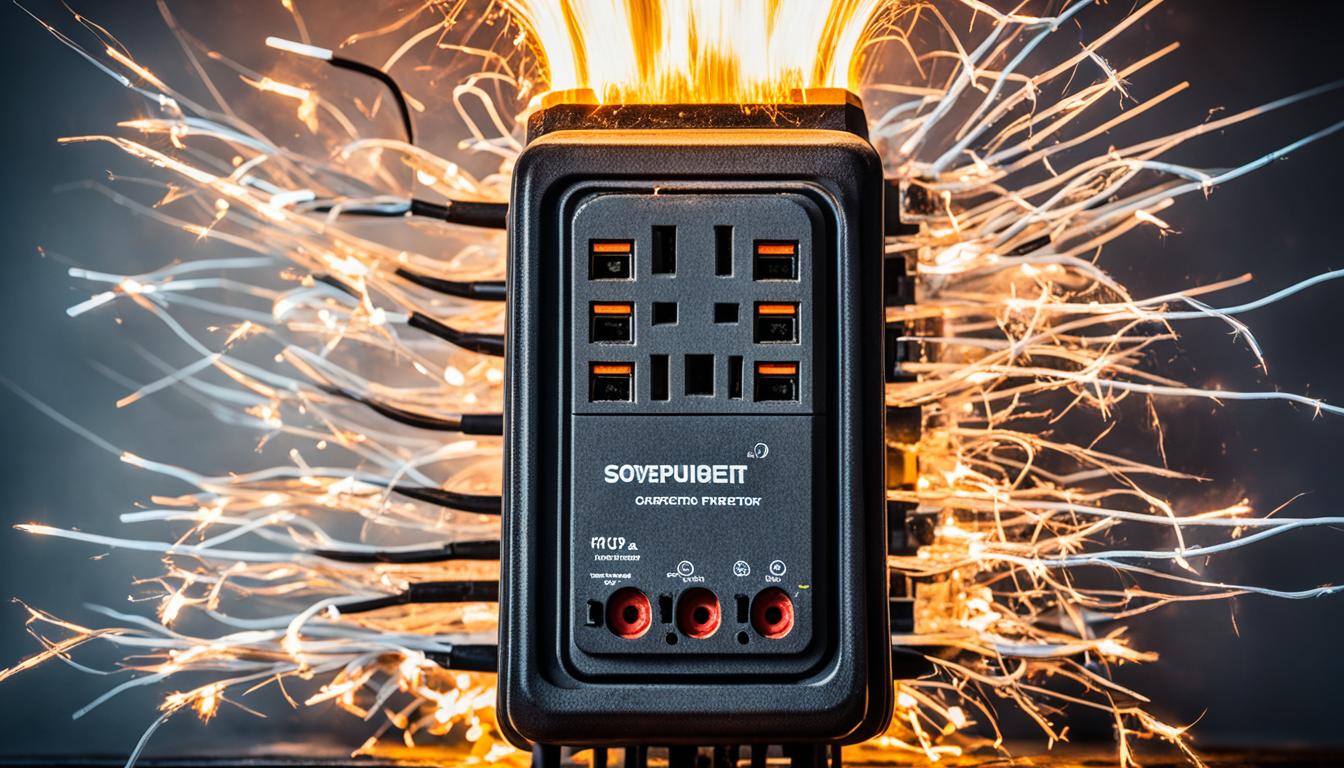According to the Electrical Safety Foundation, improper extension cord use leads to more than 3,000 house fires each year, making extension cord safety essential. Choosing the right extension cord involves considering factors such as cord length, wire gauge, and amperage limits. The gauge of the extension cord determines its capacity, with lower gauge cords having thicker wires and higher power supply. Amperage limits indicate the maximum power the cord can handle. Length also affects electrical resistance and power delivery. Extension cords are designated with letters that provide information about the cord’s appropriate use and work area. Following important dos and don’ts when using extension cords is key to safety.
Key Takeaways:
- Proper extension cord use is crucial for safety
- Consider cord length, wire gauge, and amperage limits when choosing an extension cord
- Extension cords are designated with letters indicating appropriate use
- Follow dos and don’ts when using extension cords to prevent hazards
- Heavy gauge extension cords offer higher capacity and are suitable for powerful devices
How to Choose the Right Extension Cord
Choosing the right extension cord is essential to ensure the safe and efficient operation of your electrical devices and equipment. When making your selection, consider the following factors:
Cord Length
The length of the extension cord plays a crucial role in determining its electrical resistance and power delivery. Longer cords result in lower power delivery, so it’s important to choose a cord length that matches your specific needs. Avoid using excessively long cords, as they can lead to voltage drop and affect the performance of your devices.
Wire Gauge
The wire gauge of an extension cord indicates the thickness of its wires. Lower gauge cords have thicker wires, allowing for higher capacity and efficient power transmission. Higher gauge cords, on the other hand, have thinner wires and are suitable for lower power requirements. Consider your power needs and the devices you’ll be connecting to the extension cord when choosing the appropriate wire gauge.
Amperage Limits
Extension cords are designed to handle specific amperage limits, which indicate the maximum amount of power they can safely carry. It’s crucial to match the amperage rating of the extension cord with the power requirements of your devices. Using an extension cord with a lower amperage limit can result in overheating and potential hazards.
Designations and Safety
Extension cords are often labeled with designations such as “S” for outdoor use, “W” for wet areas, and “SJ” for hard service cords. These designations provide valuable information about the cord’s appropriate use and work areas. It’s crucial to follow these designations to ensure the safety and longevity of your extension cord.
By carefully considering the cord length, wire gauge, amperage limits, and designations, you can choose the right extension cord that meets your specific needs. This ensures a reliable and safe power supply for your devices and equipment.
Important Dos and Don’ts of Using Extension Cords
To ensure extension cord safety, it is crucial to follow certain dos and don’ts when using extension cords. By adhering to these guidelines, you can prevent electrical accidents and protect your home and loved ones. Take a look at the dos and don’ts below:
Dos:
- Check for signs of damage before using an extension cord.
- Cover unused receptacles with safety covers to prevent accidental contact.
- Purchase extension cords labeled by independent laboratories, such as UL or ETL.
- Keep extension cords away from water, snow, and wet areas.
- Roll up cords neatly when not in use to avoid tripping hazards.
- Unplug unused cords to prevent energy wastage and potential risks.
Don’ts:
- Don’t use indoor extension cords outdoors as they may not be weather-resistant.
- Avoid plugging space heaters or other high-wattage appliances into extension cords.
- Don’t overload extension cords by connecting multiple power-consuming devices.
- Never force three-prong cords into two-prong outlets; use appropriate adapters if necessary.
- Avoid stapling or nailing extension cords to walls or other surfaces.
- Don’t connect multiple extension cords or power strips together; use a single, properly-sized cord.
Following these dos and don’ts is essential for extension cord safety. By using extension cords responsibly, you can minimize the risk of electrical accidents and ensure the safe and efficient use of these devices.
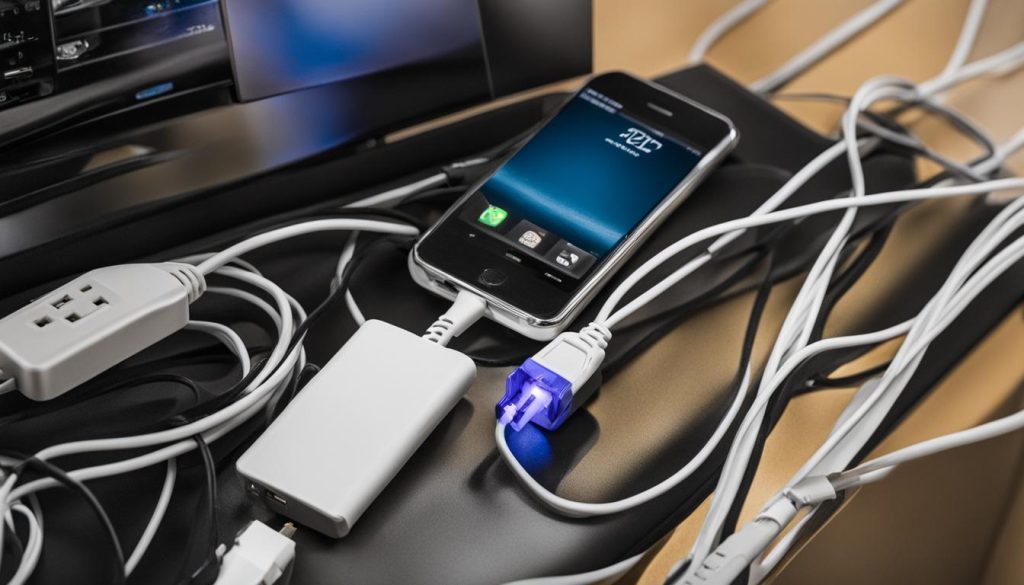
Understanding Extension Cord Types and Load Capacity
Extension cords are available in a variety of types, lengths, and sizes, each designed to handle different levels of electrical load capacity. It’s important to understand these differences to ensure safe and efficient usage of extension cords.
Extension Cord Types
Extension cords are categorized based on their load capacity and intended use. Here are the three main types:
- Light-duty extension cords: These cords are suitable for light-duty devices such as lamps, small appliances, and electronics. They have a lower load capacity and are typically used for indoor applications.
- Medium-duty extension cords: Grounded and built to handle higher power requirements, medium-duty cords are ideal for tools, portable power equipment, and certain appliances. They provide a balance between flexibility and load capacity.
- Heavy-duty extension cords: Built to withstand demanding power needs, heavy-duty cords are designed for tools, machinery, and heating appliances. They have a higher load capacity and are more durable than their light and medium-duty counterparts.
It’s crucial to select the appropriate extension cord type based on the power requirements of the devices you intend to use.
Load Capacity and Factors Affecting It
The load capacity of an extension cord refers to the amount of electrical power it can safely handle. Two key factors that determine load capacity are wire gauge and length:
Wire gauge: The gauge of an extension cord’s wires determines its load capacity. Lower gauge cords have thicker wires and can deliver higher power without overheating. For heavy-duty applications, cords with lower gauges, such as 10-gauge cords, are typically recommended.
Length: The length of an extension cord affects its electrical resistance and power delivery. Longer cords have higher resistance, which can result in power loss. Therefore, it’s important to choose a cord length that matches your requirements to maintain adequate power supply.
It’s worth noting that manufacturers often specify the maximum load capacity for their extension cords. Always follow these guidelines to prevent overloading and potential hazards.
The Importance of Safety and GFCI Protection
When using extension cords, safety should always be a top priority. Ensure that you abide by these important safety tips:
- Only use extension cords within their recommended load capacity.
- Inspect cords for any signs of damage or fraying before use.
- Follow the appliance manufacturer’s instructions regarding the use of extension cords.
- Use Ground Fault Circuit Interrupter (GFCI)-protected cords in damp or wet areas to reduce the risk of electric shock.
By understanding the different extension cord types and load capacities and following safety guidelines, you can select the right cord for your needs and ensure a safe electrical environment.
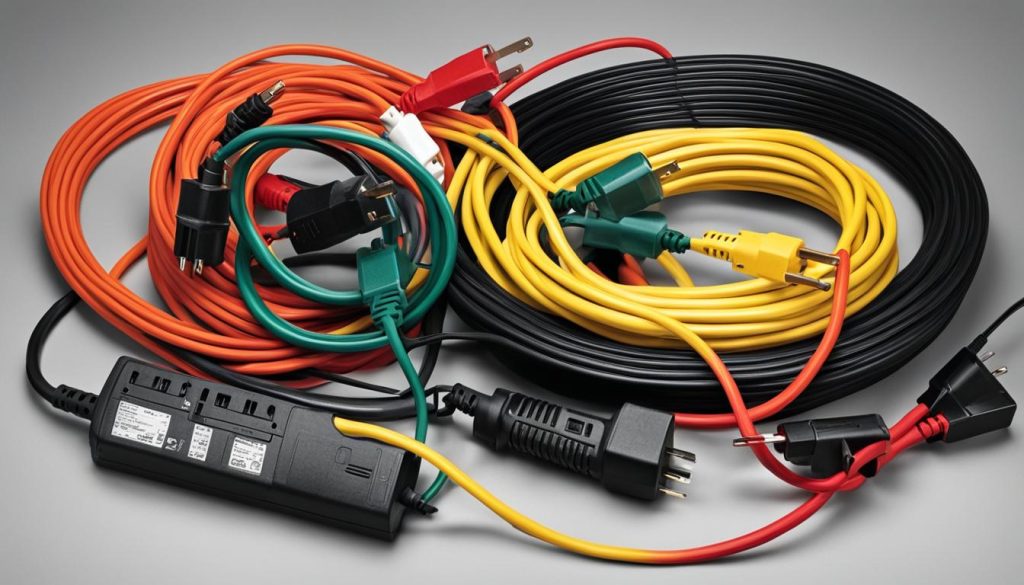
The Benefits of Heavy Gauge Extension Cords
When it comes to powering up your devices, tools, and appliances, heavy gauge extension cords, like 10 gauge cords, offer exceptional benefits that ensure reliable performance. These heavy-duty cords are designed with thicker wires and higher capacity, making them perfect for applications that require more power to run smoothly and safely.
One of the key advantages of heavy gauge extension cords is their increased power-carrying capacity. Compared to conventional cords, heavy gauge cords can handle larger electrical loads, making them suitable for demanding tasks. Whether you’re operating generators, compressors, tile saws, lawnmowers, or heavy machinery, these cords provide the necessary power without compromising performance.
Enhanced Durability and Safety
Heavy gauge extension cords are built to withstand rugged environments and heavy use. The thicker wire construction ensures greater durability, minimizing the risk of potential damage or wear and tear. This durability is especially crucial when dealing with high-power devices that can strain weaker cords.
Additionally, heavy gauge cords are often equipped with advanced safety features. Some models incorporate enhanced insulation, weather-resistant coatings, or reinforced connectors, providing added protection against moisture, extreme temperatures, and physical damage. These safety features reduce the likelihood of electrical malfunctions and potential hazards.
Longer Reach with Minimal Voltage Drop
Another significant benefit of heavy gauge extension cords is their extended reach capabilities. With a thicker wire diameter, these cords can effectively transport electrical power over longer distances. This factor is especially important when working in large areas or outdoor settings, where the power source might be far from the intended equipment.
Furthermore, heavy gauge cords minimize voltage drop, ensuring that your devices receive an adequate power supply without significant energy loss. This preserves the efficiency and performance of your tools, preventing undesirable issues such as decreased motor power or unstable operation.
Choosing the Right Gauge and Length
When selecting a heavy gauge extension cord, it’s crucial to consider your specific power requirements and environmental conditions. Choose a gauge that matches the power demands of your devices or tools, ensuring that the cord can carry the necessary current without overloading.
Additionally, the length of the cord should align with your work area and power source location. Longer cords may result in increased electrical resistance and voltage drop. Therefore, it’s essential to select an appropriate length that maintains optimum power delivery for your application.
Safety Tips for Using Heavy Gauge Extension Cords
When it comes to heavy gauge extension cords, safety should always be a top priority. Follow these essential tips to ensure the safe and proper use of your heavy gauge extension cords:
1. Avoid plugging one extension cord into another. This can lead to overloading, overheating, and potential hazards. Use a single heavy gauge extension cord that is appropriate for your power needs.
2. Do not use extension cords for permanent electrical connections. They are designed for temporary use only. If you require a permanent electrical connection, consult a qualified electrician for the appropriate wiring solution.
3. Unplug extension cords that are getting hot. Excessive heat is a clear sign of misuse or overloading. If you notice your heavy gauge extension cord becoming hot to the touch, unplug it immediately and investigate the cause.
4. Discard damaged cords. If you notice frayed wires, exposed conductors, or any other signs of damage on your heavy gauge extension cord, it’s time to replace it. Continuing to use a damaged cord can result in electrical shocks or fires.
5. Secure cords in high foot traffic areas. Make sure your heavy gauge extension cords are properly secured and out of the way in areas where people may walk or trip over them. This helps prevent accidents and injuries.
6. Avoid extreme temperatures and moisture. Heavy gauge extension cords are typically designed to withstand a wide range of environments, but extreme heat, cold, or moisture can compromise their safety. Keep them away from water, extreme temperatures, and damp areas.
7. Do not modify extension cords. Never attempt to modify or alter heavy gauge extension cords in any way. This includes cutting, splicing, or adding additional outlets. Modifying cords can lead to electrical hazards and void any warranties.
By following these safety guidelines, you can ensure the safe and proper use of your heavy gauge extension cords. Protect yourself, your equipment, and your property by taking the necessary precautions for heavy gauge extension cord safety.
FAQ
Why is extension cord safety important?
Extension cord safety is important because improper use of extension cords can lead to house fires. According to the Electrical Safety Foundation, more than 3,000 house fires are caused by improper extension cord use each year.
What factors should I consider when choosing an extension cord?
When choosing an extension cord, consider factors such as cord length, wire gauge, and amperage limits. Cord length affects power delivery, gauge determines the cord’s capacity, and amperage limits indicate the maximum power the cord can handle.
How can I ensure extension cord safety?
To ensure extension cord safety, follow important dos and don’ts. Dos include checking for damage, covering unused receptacles, purchasing cords labeled by independent laboratories, and keeping cords away from water. Don’ts include using indoor cords outdoors, overloading cords, and connecting multiple cords together.
What are the different types of extension cords and their load capacities?
There are light-duty, medium-duty, and heavy-duty extension cords. Light-duty cords are suitable for light-duty devices, medium-duty cords are grounded and handle higher power requirements, and heavy-duty cords are suitable for tools and heating appliances with high power demands.
What are the benefits of heavy gauge extension cords?
Heavy gauge extension cords, such as 10 gauge cords, have thicker wires and higher power capacity. They are suitable for devices and tools that require more power, such as generators, compressors, lawnmowers, and heavy machinery.
What are some safety tips for using heavy gauge extension cords?
When using heavy gauge extension cords, follow safety tips such as avoiding plugging one cord into another, not using cords for permanent connections, discarding damaged cords, and securing cords in high foot traffic areas.
